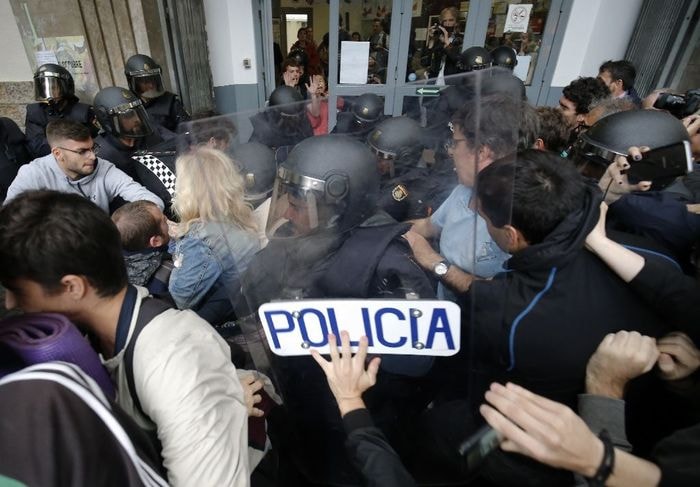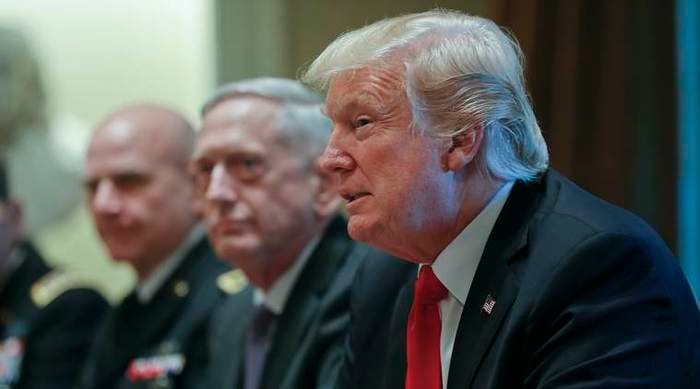The calm before the storm
(Baonghean) - A moment of calm that passes by is sometimes a signal of an impending storm, and those involved must be extremely vigilant of the situation's developments.
That has been and will be the situation that Spain in general and Catalonia in particular will have to face after the effort to de-escalate tensions has not yet had time to shine before quickly disappearing. And that is also the instability in Washington when their boss "vaguely" about the future of the historic nuclear deal signed with Iran.
 |
| Spanish police clashed with people outside a referendum polling station in Barcelona on October 1. Photo: AFP |
Catalonia is not yet at peace.
Spain’s deepest political crisis in decades appeared to be on the mend after Madrid issued its first apology to Catalans injured in clashes with police during the illegal referendum. But it’s not that simple, and there’s a chance of more protests, prolonging the unrest in the country’s northeast, a tourist destination with a population of 7.5 million and a fifth of Spain’s economy.
Catalan leaders have threatened to unilaterally declare independence, while Spanish Prime Minister Mariano Rajoy has pledged to block it, rejecting any attempts to mediate the dispute. Separatists have called for protests across Spain, with a major show of force taking place in Barcelona on 7 October.
On the same day, advocates for dialogue to end the crisis also planned to meet in an effort to put pressure on mayors across the country. The as-yet-unnamed initiative has been circulating on social media, calling for dialogue to be promoted.
Yet just a day earlier, October 6 saw the first signs that the parties were willing to step back from the brink of political conflict that threatened to destabilize Europe. After several days of unsmiling rhetoric, the Spanish central government expressed regret for the casualties and proposed that Catalonia hold regional elections to resolve the crisis.
“I can do nothing but regret and apologize on behalf of the police officers involved” to those injured in the clashes at last weekend’s referendum, said Enric Millo, the Spanish government’s representative in Catalonia.
Meanwhile, Catalan leader Santi Vila has said his faction could consider a “ceasefire” in the dispute to avoid further crackdowns by Madrid.
According to Western media, the Spanish Constitutional Court has ordered the suspension of the secession planned for October 9 in the Catalan parliament, where some leaders will call for a declaration of independence. If the secession scenario above occurs, there is no doubt that Spain will most likely respond by suspending the current autonomous status of this region, imposing direct rule from Madrid.
Not to mention on another front, because the government in Madrid has pushed for measures to put economic pressure on Catalonia, through a resolution making it easier for businesses to move their headquarters to other regions.
Through this, Catalan authorities will be forced to be very cautious and consider carefully when making decisions, to avoid pushing the people into misery, both political instability and economic difficulties. In the short term, public opinion may continue to witness the image of an uneasy Catalonia, when both sides have not yet yielded and effectively de-escalated.
 |
| Donald Trump could withdraw from the Iran nuclear deal next week. Photo: AP |
Iran nuclear deal coming?
On the last working day of the week, US President Donald Trump, either intentionally or unintentionally, fanned the uncertainty hanging over Washington by using a group photo before a dinner with military leaders and their families, implicitly warning that the evening represented “the calm before the storm.”
When reporters asked questions, the White House owner only said: "You will see", without clearly mentioning whether he was threatening military action, or simply "stirring up" more tension. Trump's seemingly ambiguous statement attracted public attention, causing White House press secretary Sarah Huckabee Sanders to repeatedly refuse to explain clearly, but still accidentally revealed the "keywords" Iran and North Korea when reporters "prodded" him.
The United States is currently in a period of nuclear tension with North Korea, and it is likely to increase in the Gulf if Trump washes his hands of the nuclear deal, according to the Guardian. Also on October 6, several media channels confirmed what has long been suspected in Washington and foreign capitals: that Trump will overrule his senior national security aides and will not certify the 2015 international nuclear deal with Iran, on the grounds that it does not serve US security interests.
If that happens next week, as expected, it will trigger a 60-day window for Congress to reimpose sanctions. If they do, it will cause the historic deal to collapse and return to a tense standoff in the Middle East over Iran’s nuclear program.
Not only that, the failure to certify the Iran deal also threatens to spark a second nuclear confrontation at a time when the US is ready to join North Korea. Evidence of that crisis has recently escalated, such as Pyongyang's 6th nuclear test, a series of tests of medium- and intercontinental-range missiles, and the war of words between the two US-China leaders...
America needs to be extremely vigilant, because a threat that at first glance does not seem so formidable, but if launched at the wrong time, can cause the situation to go beyond imagination.
Phu Binh
| RELATED NEWS |
|---|

